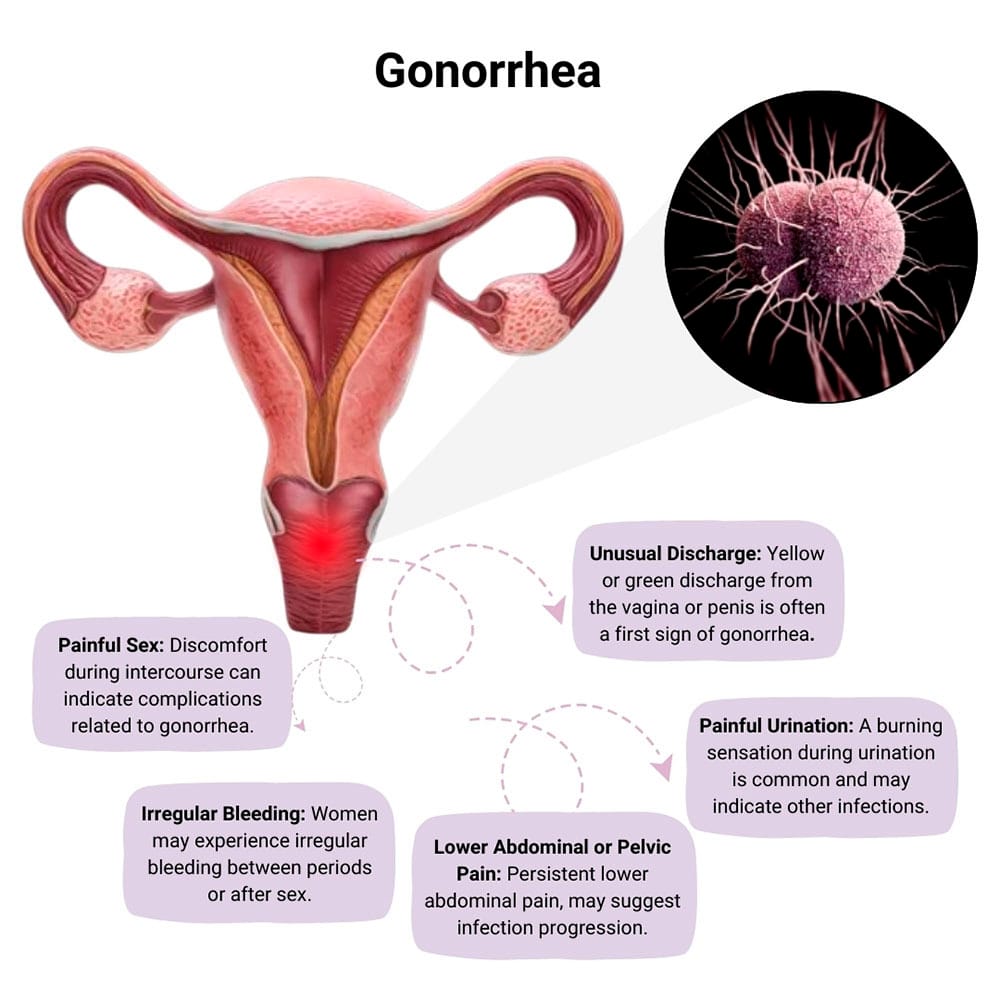What Is Gonorrhea?
Gonorrhea is a common sexually transmitted disease that affects millions of people each year. It’s caused by a bacterium and spread by sexual contact through vaginal fluid and semen. It can affect you if you engage in sexual activity, including vaginal, anal or oral sex.
Whether you need routine care treatment for an STD or specialized surgery, Cohen Medical Practice (CMP) offers advanced gynecological procedures, as well as feminine health care services ranging from Pap smears to menopause care.
The founder and director of CMP, Dr. Felix Cohen and his team of experts offer treatment and prevention advice for many STDs, including:

What Are Gonorrhea Symptoms and How Is It Diagnosed?
Gonorrhea can be asymptomatic, which means you or your partner may not know you have it. You might feel perfectly healthy while having the infection. But when you do experience symptoms, they might include painful urination, increased vaginal discharge or bleeding between periods.
If you ignore it, gonorrhea can lead to more severe issues, such as:
- Pelvic inflammatory disease
- Chronic pelvic pain>
- Ectopic pregnancy
- Infertility
- Human immunodeficiency virus (HIV)
Diagnosing gonorrhea usually starts with a medical check-up. You may need to provide a urine sample to be analyzed in the lab that detects the genetic material of Neisseria gonorrhoeae, which is the bacterium responsible for gonorrhea. Your CMP doctor may also take swab samples for diagnosis.
Several other methods are used to diagnose gonorrhea as well, such as:
- Urethral swab. This is performed on men and involve inserting a swab into the urethra to collect a sample. It’s usually quick, but your partner may feel some discomfort.
- Cervical swab. For women, a swab is taken from your cervix during a pelvic examination. This procedure is also quick and can often be done during a routine gynecological visit if you’ve had unprotected sex recently or believe you’ve been exposed to an STD.
- Throat and rectal swabs. Your doctor might take samples from these areas to check for gonorrhea if you’ve had oral or anal sex.
You usually get your test results within a few days. In some cases, results may be available within a few hours. If you think you may have gonorrhea, it’s essential to avoid sexual activity until you receive a negative test result.
What Are the Treatment Options for Gonorrhea?
You can effectively treat gonorrhea with antibiotics. Your CMP doctor may suggest a combination of antibiotics to cure the infection, especially if you’ve been infected with chlamydia too, which is common with gonorrhea. You may notice an improvement in your symptoms once you start your treatment.
You must complete the entire course of antibiotics to ensure the infection is fully cleared to:
- Prevent reinfection. The bacteria may still be present even if your symptoms improve. Stopping treatment too early can cause the infection to return.
- Avoid antibiotic resistance. Gonorrhea is becoming more resistant to antibiotics. If you don’t complete your treatment, the bacteria can build resistance, making future treatment difficult.
- Protect your partner. If you take the risk of transmitting the infection to your sexual partner, you also risk getting it passed back to you, especially if you stop the round of treatment medications. Avoiding sexual activity is recommended until you’re confirmed clear by your doctor.
- Prevent further complication. Untreated, gonorrhea can lead to a host of serious, and sometimes permanent complications such as miscarriage and dangerous infections.
Your physician may recommend a follow-up test about two weeks after your treatment to make sure the infection has been fully cleared. If you have a regular sexual partner, they must get tested and treated for gonorrhea as well. Make sure your partner completes their treatment and follows the same post-treatment guidelines.
Can I Prevent Gonorrhea?
Using a condom from start to finish during any sexual activity is the most effective way to prevent the STD. Whether you’re having vaginal, anal or oral sex, use latex or polyurethane condoms correctly every time to reduce your risk of transmitting gonorrhea. A dental dam also acts as a protective barrier during oral sex, which also helps prevent the spread of gonorrhea and other infections.
Dr. Cohen helps you prevent gonorrhea with tips and advice that include:
- Regular STD screenings
- STD tests when you’re pregnant
- Safe sex education and counselling
- Partner testing and treatment
- Follow-up care and monitoring
Limiting your number of sexual partners also lowers your risk of contracting gonorrhea and protects you from long-term complications like PID or HIV. You should avoid douching as it can increase your risk of contracting gonorrhea and other STDs. When you douche, you disrupt the natural balance of bacteria in your vagina and create an environment where harmful bacteria can grow.
For people in NYC seeking treatment for gonorrhea, Cohen Medical Practice (CMP) offers the experience and expertise you can rely on. Dr. Cohen is a board-certified obstetrician and gynecologist who has helped countless individuals recover from gonorrhea and other infections. Contact Cohen Medical Practice (CMP) in Midtown NYC today to start your treatment.

